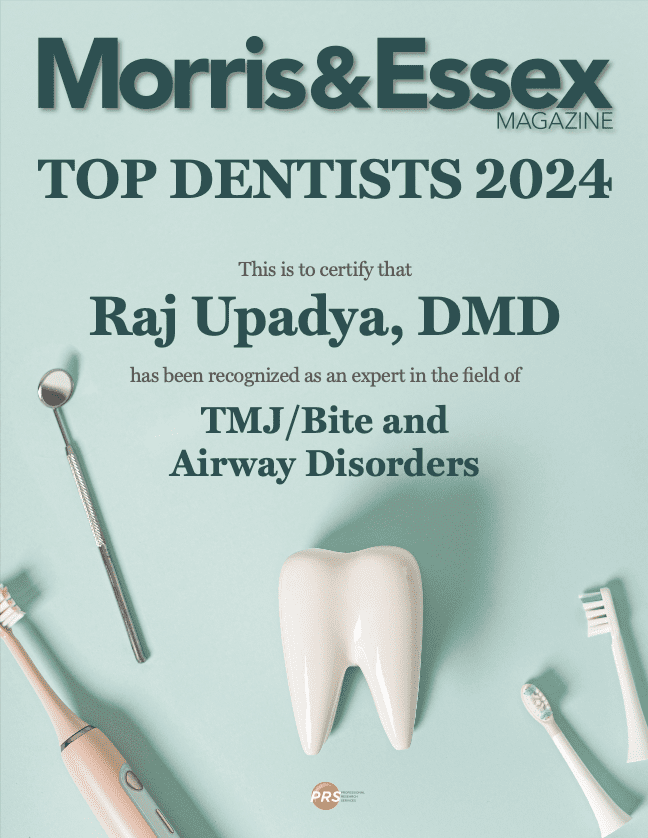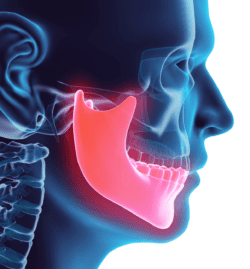Occlusal & TMJ: An Overview
Millions of people suffer from chronic headaches, unexplained earaches, and other facial pain yearly. In many cases, dental problems and temporomandibular joint disorders (TMD) are to blame. Few dentists and physicians are trained and experienced in diagnosing and treating TMJ disorders, also known as occlusal disease.

Dr. Raj Upadya of Metropolitan Center for Complete Dentistry in East Hanover, NJ, is one of the country’s leading dentists for treating TMJ disorders and complex dental problems resulting from long-term TMJ dysfunction. TMJ treatment is a restorative dentistry treatment we provide to the public in East Hanover, New Jersey.
Most patients suffering from TMJ dysfunction do not recognize the symptoms or realize they have a dental-related problem. Several factors contribute to TMJ dysfunction. The most common symptoms include teeth grinding, frequent headaches, neck, and facial pain, clicking or popping in the jaw joints, and tooth wear.
TMJ treatment depends entirely on the patient. Dr. Upadya treats TMJ symptoms through a wide range of treatments, from splint therapy and night guards to bite correction procedures.

Common Causes of TMJ Disorders
There is no single cause for TMJ dysfunction. Any number of factors or combination of factors may be to blame, including:
- Trauma to the head, neck, or face
- Trauma to the TMJ joint or arthritis
- Hormonal changes or imbalances
- Malocclusion (where the jaws do not line up correctly, resulting in bite problems)
- Stress and other environmental factors
Common TMD Symptoms
As with the causes, symptoms of TMJ disorder vary greatly among patients. TMJ symptoms often mask themselves or are similar to those of other medical conditions, making diagnosis extremely difficult. Common symptoms of TMJ disorder include:
- Headaches
- Shoulder, neck, facial pain
- Clicking or popping when opening or closing the jaw
- Locked jaw or limited mobility in the jaw joint
- Teeth clenching, teeth grinding, often accompanied by tooth wear
- Chronic earaches
TMJ Disorder FAQs
Can I live with TMJ without getting treated?
Yes, TMJ pain can go away on its own, but there is no guarantee that it won’t return. Your dentist can evaluate your issue and tell you whether it warrants treatment.
Do I have to visit a TMJ specialist?
No. There is no specific medical or dental specialty of certified experts. Your dentist is the best resource for TMJ diagnosis and treatment.
What can alleviate TMJ pain before I visit the dentist?
You can do a couple of things to alleviate jaw pain temporarily. Take an ice pack and apply it to the affected area. Take non-steroidal anti-inflammatory drugs that can help reduce facial swelling.
Do I need surgery to get rid of TMJ?
No. Surgery is only necessary if you have severe TMJ issues and jaw deformities. Our dentist in East Hanover, NJ, provides conservative options for mild to moderate TMJ problems.
What should you not do with TMJ?
Patients with TMJ should never chew gum. They should also avoid eating hard or chewy foods, grinding or clenching their teeth, and only chewing on one side.
How should I sleep with TMJ?
Patients should sleep on their backs if they have TMJ. This will put less pressure on their jaw while supporting their neck, head, and shoulders.
Occlusal & TMJ: What to Expect
TMJ treatment through splints, mouth guards, and night guards can help to alleviate the most common symptoms of TMJ dysfunction. Dr. Upadya recommends this conservative treatment option for occlusal disorders whenever possible.
An oral appliance is a removable device that helps keep the teeth and jaw in proper position during sleep and prevents teeth from grinding or clenching. Prolonged teeth grinding or clenching can lead to tooth wear and contribute to tooth decay and gum disease.
Advanced Technology For TMJ Diagnosis & Treatment
Dr. Upadya uses cutting-edge technology to help him diagnose and treat TMJ disorders. These advanced technologies allow him to pinpoint the source of the dysfunction for a more accurate diagnosis and treatment plan.
- Doppler Ultrasound: The Doppler ultrasound is a useful diagnostic tool for TMJ therapy. Dr. Upadya can listen to the jaw joints and look for inflammation, instability, or other hidden problems.
- Joint Vibration Analysis: Joint Vibration Analysis, or JVA, is an important diagnostic tool for patients with TMJ problems. Similar to headphones, this advanced technology records the vibrations in the jaw joints to pinpoint signs of instability.
- BioResearch EMG: Surface EMG allows Dr. Upadya to record muscle-specific activity in skeletal muscles to identify problems in the TMJ system.
- T-Scan: The T-Scan is a powerful tool that measures a patient’s bite’s timing and relative force. This analysis type is impossible through traditional diagnostic methods or visual evaluation.
Schedule A Consultation
If you are concerned that you may have a bite problem or TMJ disorder, schedule an appointment with Dr. Upadya. He will thoroughly evaluate your bite function and overall dental health condition. He will then be able to offer his patients the proper TMJ treatment in the Summit, NJ, and East Hanover, NJ areas.
